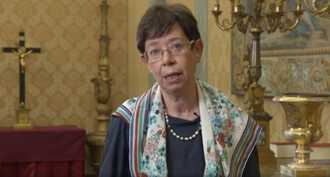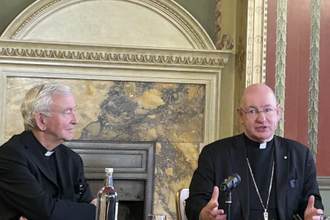Vatican at UN: Statement on Women

Ms Francesca DiGiovanni
On October 1, Ms Francesca DiGiovanni, Undersecretary for the Multilateral Sector of the Section for Relations with States of the Secretariat of State of the Holy See, prepared a pre-recorded intervention from the Vatican to be given during today's United Nations High-Level Meeting on the Twenty-Fifth Anniversary of the Fourth World Conference on Women, held in Beijing in 1995. The Statements from UN Member States and Permanent Observers are all being delivered via pre-recorded message because of travel restrictions to New York during COVID-19.
In her remarks, DiGiovanni said that the Beijing Conference drew attention to important and urgent questions regarding the dignity, role and rights of women. The Holy See actively contributed to the Conference, she said, and remains a steadfast promoter of the dignity of women. Over the past 25 years, she said, the world has witnessed many great advances for women, but also many new forms of poverty and exploitation as well as threats to their life and dignity. She focused on four key areas: lifting women out of poverty; education; health care; and the dehumanization and violence many women endure. She underlined that in some places, certain aspects of women's sexual and reproductive health have been overemphasized, to the detriment of women's capacity for motherhood. She added that others are seeking recognition of "new rights" not found in the Beijing Conference or in international human rights treaties. She said that addressing the challenges women face today must involve everyone, with women leading the effort in harmony with men.
The text of the statement by Ms Francesca Di Giovanni, Under-Secretary for the Multilateral Sector of the Section for Relations with States of the Holy See follows:
Mr President,
The Holy See is pleased to participate in this High-level meeting on the occasion of the twenty-fifth anniversary of the Fourth World Conference on Women held in Beijing.
The Conference drew the world's attention to important and urgent questions regarding the dignity, role and rights of women, questions made more significant as we mark the 75thanniversary of the United Nations, whose Charter affirms the equal rights of men and women.[1]
The Holy See actively contributed to the Conference and remains a steadfast promoter of the dignity of women, based fundamentally on the recognition that the dignity of every human being, man or woman, is the foundation of the concept of universal human rights.
Over the past quarter century, while the world has witnessed many great advances for women, we have also seen the diffusion of what Pope Francis calls a "throwaway culture,"[2]which has brought new forms of poverty and exploitation to many women, as well as new threats to their life and dignity.
We would like to focus on four key areas.
The first concerns lifting women out of poverty. On the economic level, ensuring greater parity between women and men must include equal access to employment, property, capital, financial services and technology, equal pay for equal work, fairness in career advancements, and due recognition for unpaid care and domestic work. Women's economic advancement should not require them to choose between work and the desire to have a family. Moreover, women must be recognized as dignified protagonists of their integral development, which involves their full cultural, social and political participation.
A second key area is education. Girls still constitute the majority of the children not enrolled in primary school, furthering the cycle of inequality. The Catholic Church, through thousands of educational institutions, many of which are run by women religious, has, in numerous places, filled the gaps to ensure that girls also receive instruction. Furthermore, adequate support should also be given to parents so that they can fulfil their primary right and responsibility of educating their children, girls as well as boys.
A third crucial area involves health care. Hundreds of millions of women and children lack basic health care and adequate nutrition and sanitation. Rather than investing resources to remedy those deficiencies and improve the overall health and wellbeing of women, some have overemphasized certain aspects of a women's sexual and reproductive health, including the suppression of their capacity for motherhood. Others are constantly seeking recognition of so-called new rights, which are not found in the mandate of the Fourth World Conference nor in international human rights treaties: women deserve better. Their health must be cared for in a more holistic way, in particular, in those situations of emergency, where what sometimes is considered an "immediate solution" actually involves further violence, isolation and despair.
The final concern is the dehumanization and violence so many women endure. The Fourth World Conference shed a much-needed light on various forms of brutality that women and girls suffer. Sadly, such violence cruelly continues. Pope Francis recently recalled that so many women today "are continually insulted, beaten, raped, forced to prostitute themselves and to suppress the life they bear in the womb."[3]Women and girls continue to suffer from the widespread hedonistic and commercial culture that reduces them to sex objects and their bodies to consumer products, as happens in pornography, surrogacy and human trafficking.
Addressing the challenges women face today must involve everyone, with women leading the effort in synergy with men. Women have special gifts that can reverse the throwaway culture and remedy its effects. Every step forward for women is therefore a big step forward for authentic culture and for humanity.
Thank you, Mr President.
[1]Charter of the United Nations, Preamble.
[2]Pope Francis address to World Meeting of Families in Ireland, Dublin, 25 August 2018.
[3]Pope Francis. Homily in occasion of the Solemnity of Mary Mother of God, Vatican Basilica, 1 January 2020.
[4]Letter of Pope John Paul II to Women, 29 June 1995.


















